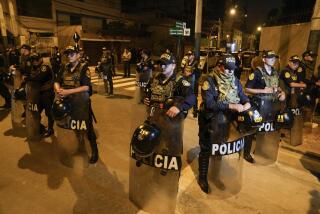Artwork Seized at U.S. Home of Marcos Kin
SAN FRANCISCO â A team of federal agents that raided the home of Ferdinand E. Marcosâ son-in-law and business confidante seized a vanload of paintings, sculptures and antiques believed stolen from the Philippines by the deposed dictator, federal officials said Tuesday.
The raid, carried out in Woodside, Calif., last week by FBI, Customs Service and Internal Revenue Service agents under a search warrant, comes at a time when pressure is mounting on Marcos to enter into a plea bargain agreement to avoid a federal fraud indictment in New York.
Assistant U.S. Atty. Charles Burch said here that federal agents used a rented van to haul the art objects from the home of Gregorio Araneta III, the business manager for the Marcos clan and the husband of the youngest Marcos daughter, Irene.
As many as 50 federal agents searched Aranetaâs sprawling home in Woodside, an affluent wooded suburb 25 miles south of San Francisco, on Friday morning. Neither Araneta nor his attorney could be reached for comment.
$1.3 Million Wedding
Araneta, 40, was a land developer during the Marcos regime. Marcosâ wife, Imelda, spent an estimated $1.3 million on Aranetaâs wedding to Irene Marcos in June, 1983, including restoration of the Philippine town where the ceremony was held and construction of halls to accommodate the guests, it was reported at the time.
Burch said that the art objects seized from Aranetaâs home may be part of a collection purchased by the Marcoses through intermediaries from New York philanthropist Leslie R. Samuel in September, 1981. Other sources have identified the Samuel collection, valued at as much as $5.9 million, as among the Marcos familyâs allegedly ill-gotten wealth.
The items could be âsubject to claims by persons or governments,â Burch said, suggesting that the government of Corazon Aquino may seek to recover the items as part of its effort to reclaim wealth for the Philippines that was amassed by Marcos during his regime.
Rare Books, Paintings
Some items from the estate initially were housed in a Philippine museum, but some were said to have appeared in a New York townhouse owned by Imelda Marcos. The collection included rare books, paintings, furniture and sculptures.
The search indicates that the criminal investigation of Marcos in New York is coming to an end. U.S. Atty. Rudolph Giuliani of Manhattan has recommended to Justice Department officials in Washington that Marcos be indicted.
Marcos is expected to be offered a negotiated plea bargain within days, although the possibility remains that President Reagan could veto an indictment of Marcos, a longtime friend and ally.
The search warrant enumerated 18 specific items that agents were seeking. Sources said that some of the information sought could be important in a separate investigation in Hawaii into allegations that Marcos has tried to destabilize the Aquino government, an effort that could have violated the U.S. Neutrality Act.
The U.S. attorneyâs office in New York is investigating allegations that Marcos used an elaborate scheme of phony companies and fronts to conceal the ownership of his artwork and his real estate holdings in New York.
Court Prohibitions
Courts in New York and California have prohibited Marcos from hiding or disposing of his assets while the Aquino government presses its effort in the courts to reclaim Marcosâ assets.
Sources familiar with the case say that prosecutors were intrigued by what they found in Aranetaâs home because it suggests that the items were moved across state lines, perhaps in violation of the prohibitions on Marcos against concealing or disposing of the assets.
Marcos had transferred some of his artwork to Saudi Arabian financier Adnan Khashoggi after the former Philippine leader arrived in Hawaii following his ouster in 1986. Khashoggi later offered much of the artwork for sale off his yacht.
After legal proceedings in Europe, U.S. agents took custody of millions of dollarsâ worth of masterpieces that Khashoggi had kept and transported them from Paris to the United States, where they may be used as evidence in the New York case.
Morain reported from San Francisco and Rempel from Washington.
More to Read
Sign up for Essential California
The most important California stories and recommendations in your inbox every morning.
You may occasionally receive promotional content from the Los Angeles Times.










